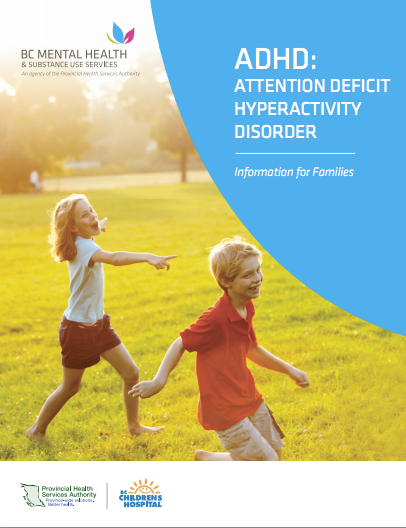Kelty Mental Health: Information for Families on ADHD
The Attention Deficit Hyperactivity Disorder (ADHD) pamphlet produced by BC Mental Health & Substance Use Services (an agency of the Provincial Health Services Authority) provides families with information on the four primary treatment approaches that help manage ADHD:
- Education about ADHD
- Medications
- Parenting Strategies
- School Accommodations
 The pamphlet informs that ADHD is a highly genetic brain-based disorder that impacts school, learning, relationship, self-esteem and safety, and the three presentations of ADHD: 1) Inattention; 2) Hyperactive/Impulsive; 3) Combined.
The pamphlet informs that ADHD is a highly genetic brain-based disorder that impacts school, learning, relationship, self-esteem and safety, and the three presentations of ADHD: 1) Inattention; 2) Hyperactive/Impulsive; 3) Combined.
The guide stresses that there are no tests, brain scans or blood tests for ADHD. Assessment/diagnosis can be made by a medical doctor or psychologist who specializes in ADHD based on information from caregiver interviews and ratings of a child’s behaviour in different settings on standardized questionnaires.
The guide states that, “ADHD can range from a mild, hardly noticeable disorder, to one that is very severe.” Once a diagnosis is made, families come to understand that ADHD is a disorder requiring ongoing treatment (e.g. like diabetes). Support and treatment helps children with ADHD cope and live with a good quality of life and develop their highest potential.
The pamphlet states that some cases of ADHD are severe enough to have a significant impact on daily life at home, school and in friendships, and medication may assist a child to:
- Concentration and focus
- Make less impulsive decisions
- Stop and think before acting
- Cooperate
- Get more work done at school
- Improve handwriting
- Be less aggressive
The guide discusses contra-indications for medication, development of tolerance to medication, and the potential dangers of combining medication with alternative diets or products.
The guide gives a detailed outline of the ten guiding principles of Behavioural Parenting, shown to help manage the challenging behaviours of children with ADHD. Often, 8 – 12 week courses are available to help parents build these skills.
- Give more immediate and frequent feedback and consequences: Children with ADHD are often ‘in the moment’ so use this to have more effect. Use praise and incentives repeatedly – don’t just say it once, and don’t wait to the end before giving feedback.
- Use incentives instead of punishment: Children with ADHD already receive more punishment than others. It is not very effective at changing behaviour. Catch your child being good. Give at least 2-3 times as many rewards as penalties. Do not expect children with ADHD to be self-motivated to do things that are boring, difficult or require effort. Create a ‘reward bank’ that can be traded for incentive prizes.
- Give visual reminders of what to do next and how much time is left to do it: Children with ADHD have a different sense of time, so they need reminders like visual timers, alerts, tweets. Break large tasks into small steps.
- Make thinking and problem-solving more concrete: It is difficult for children with ADHD to mentally think through a problem, so help them to see it in visual and ‘hands-on’ ways, using pictures, diagrams and blocks when teaching, or modeling a skill as a guideline for them to repeat.
- Be consistent: Children with ADHD do best with structure and routine. Consistency of behavioural management is important; try a strategy for at least 1-2 weeks before giving up.
- Act, don’t yak: Children with ADHD respond much more to action consequences and feedback, than to talking and reasoning.
- Plan ahead for problem situations: Think about where your child is likely to misbehave (e.g. grocery shopping) and develop a plan to manage the situation (e.g. helping with tasks for boredom; music through headphones for noise sensitivity). Share the plan with your child, and then follow through.
- Keep a disability perspective: Realizing that your child has a disability will help parents to react more calmly and use more helpful strategies for your child. Remember that your child behaves differently because your child doesn’t have the skills to behave any other way.
- Don’t personalize your child’s problems or disorder: Your sense of worth and dignity is not based on whether you ‘win’ an argument or a difficult encounter with your child.
- Practice forgiveness: Let go of destructive emotions like anger, guilt and disappointment with your child, yourself, and with others who may not understand.
The guide suggests that counselling or family therapy may prove useful to help with communication, expectations, and issues that are not caused by, but complicated by ADHD, particularly for a child who also struggles with anxiety or depression or has had a traumatic life.
The guide provides a one-page summary of key points for parents to copy and share with their child’s teacher and a toolkit for parents in helping children with ADHD cope with the challenges of homework (realistic goals and tips to make the homework process more manageable ). It also suggests the benefits of one-on-one tutoring on a weekend morning, with a tutor experienced in working with children with ADHD.
The guide suggests finding opportunities for broadening the child’s social network to include relationships outside of school connections, particularly through engaging in small groups that offer organized, well-planned social activities, with leaders who are prepared to help your child learn social skills in a safe and friendly environment. Friendship can pose challenges for children with ADHD. They are often social and open to friendship, but may have problems getting along with their peers or interacting with teachers and other authority figures.
Finally, the guide provides a list of Provincial ADHD Program Resources for Parents.
